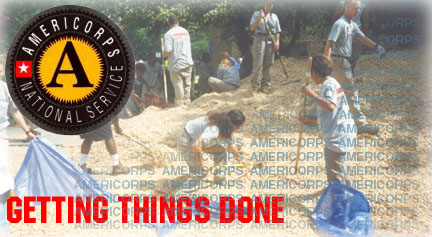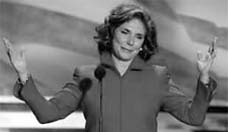
Turf Battles Derail Funding for Faith Based Initiatives
Turf Battles Derail Funding for Faith Based Initiatives
By Doug Brown and Jeanie Stokes
A year after President Bush took office with plans to expand use of religious charities for federally funded social services, his controversial faith-based initiative appears in disarray.
With the shadow of terrorism and recession still darkening the American landscape, Bush must balance his need for national unity against growing religious tensions as he pushes legislation in an election year. While few members of Congress seem enthusiastic about further blurring of the line between church and state or antagonizing religious minorities, Bush's lengthy delay in naming a new White House director of faith-based initiatives conveys a waning sense of urgency.
That has left many of the nonprofits that might tap into the federal funds uncertain about where they stand.
"I frankly don't think it (faith-based initiative) is going to go anywhere," said William Devlin, president of the Urban Family Council of Philadelphia/New York City. Given the political capital that was expended on the issue during the campaign of 2000 and by the Bush administration in 2001, he said, "we have reached the point of no return."
Said Devlin, "The whole thing became one big huge mess in Washington where men and women failed to lead because they don't want to bleed."
Marvin Olasky, a University of Texas journalism professor, author and World magazine editor mentored Bush on the concepts of "compassionate conservatism" and faith-based social services. He conceded there is a lack of real support in Congress for the Bush faith-based legislative agenda, even in the House of Representatives, where it passed last July.
"I talked with a number of members of the House of Representatives and there was no enthusiasm for it at all," Olasky said. "They still voted for it because they had promised to. But the only reason it passed was because of the personal plea" of President Bush, he said.
"As far as the legislative piece, it seems to me perhaps we need to go back to the drawing board," Olasky said. "I think we learned in last year's exercise that there are real theological and cultural divides in America."
While the events of September 11 have shown how faith-based organizations, such as The Salvation Army, can help in a crisis, the crackdown on Islamic charities accused of having terrorist links has raised questions of religious favoritism by some Muslim nonprofits.
Among fundamentalist Christians, the idea that federal funds might go to the Nation of Islam charities, Hare Krishnas, Scientologists or Mormons has weakened support. Christian Broadcasting Network founder and former presidential candidate Pat Robertson withdrew his backing of the initiative because of those issues. Conservative religious leader Jerry Falwell, however, said he still supports the initiative but remains cautious about how it will be implemented.
"The availability of gifts to faith-based groups must be made with no strings attached as far as what they preach, teach or practice," Falwell told The NonProfit Times. "Bush understands that. I have no concerns about what he wishes to do. But George Bush won't be president forever. I am still not convinced that government funds won't bring in government intervention (into religious organizations) at some point."
Falwell, whose ministry is based in Lynchburg, Va., also echoed a concern of civil libertarians who oppose federal funds going to any religious organization. "One of my concerns will be there will be Johnny-come-latelys that have shown no interest in helping indigent people until suddenly public funds are available," he said. "I question whether some of these are doing work because of the Lord or because money is available. It would bother me greatly to learn we are fattening the wallets of executives of some faith-based ministries."
Some inner city religious leaders, meanwhile, are suspicious of the religious right and its mostly white male leadership.
By order, not law
Despite those setbacks, the faith-based initiative is still very much alive, insiders contend. Though the United States Senate could not resolve the contentious issues of civil and religious rights raised by sharing funds between sect and state, Bush has issued executive orders to five cabinet-level departments demanding more use of religious organizations for social services. Under the directive, the departments of Education, Health and Human Services, Housing and Urban Development, Justice and Labor are expected to use existing regulations to ease access to federal grants by grass-roots religious groups.
The legislative roadblock has also prompted the Bush Administration to steer much of its faith-based effort to the Corporation for National and Community Service, the federal agency that operates AmeriCorps and other volunteer programs. Two advisers to the White House, Lisa Trevino Cummins and Rev. Mark V. Scott, have been given a mission to help black and Hispanic churches that offer social services qualify for federal grants. The idea is that churches can then, in turn, attract AmeriCorps volunteers.
The corporation is the ideal agency to administer the programs, as it has offices in every state and commissions in 48 states, all of which are local and controlled by the state governor, said Scott, who co-chaired the Task Force on the White House Faith-Based and Community Initiatives. It's important, he said, that the federal government get as close as possible to the grassroots in delivering its services. That proximity to the street, he said, is what the corporation can provide.
The corporation is connected by "a dotted line" to the White House, where it is appreciated by President Bush, Scott said. When he worked at the White House Office of Faith-Based and Community Initiatives before moving to the corporation, "there was more work than we could handle," Scott said. The White House faith-based office, he said, "was deluged, swamped, with interest from all over the country."
Where does the shift in emphasis leave the White House's faith-based office? Creation of the director's position, filled for six months by University of Pennsylvania Professor John DiIulio, represented a landmark in church-state relations. DiIulio, who said the strain of commuting from Philadelphia to Washington was posing a threat to his health, became a target for those on the left and the right while seeking ways to coordinate staggering layers of bureaucracy. Though White House officials promised a prompt replacement, the events of September 11 intervened, leaving no successor in sight. DiIulio did not return telephone calls seeking comment.
"The office of faith-based initiatives has essentially been directed by an empty desk," said Jon Van Til, author and professor of urban studies at Rutgers University at Camden, N.J. "Probably the faith-based office is going to turn into something that is less than an office and more of an inter-departmental task force."
Leslie Lenkowski, who heads the Corporation for National and Community Service, said events of September 11 added confusion to the faith-based office after DiIulio's departure.
"Sooner or later we will figure out what that office in the White House should be long term," he told a meeting of the Independent Sector last fall. "But for the purposes of this program, it's making less and less difference."
Even before Bush took office, nearly 6,000 of the total 40,000 AmeriCorps positions were in faith-based organizations, such as Habitat for Humanity, the Catholic Network for Volunteer Service and the National Jewish Coalition for Literacy. Approximately 45,000 Senior Corps volunteers provided 10 million hours of service to faith-based organizations, such as the Salvation Army and Lutheran Social Services. Dozens of service-learning grants went to faith-based organizations and universities.
When he launched the Corporation for National and Community Service, former President Bill Clinton also directed the agency to dabble in faith-based groups' efforts. Under the welfare reform act of 1996, a new reliance on religious organizations emerged under the heading of Charitable Choice.
While church groups have been required to create separate, non-religious 501(c)(3) organizations to qualify for federal funds, Bush wants to relax those restraints and permit religious symbols and practices in the delivery of federally funded social services.
Under a bill sponsored by senators Joseph Lieberman (D-Conn.) and Rick Santorum (R-Pa.), religious organizations would be able to retain their religious identities as long as they meet other requirements. That would let churches and synagogues use their facilities for day care or elder care programs, for example, without removing crosses or menorahs.
Catholic Charities, which was set up years ago as a separate entity from the Catholic Church to qualify for government funding, has been pressured at times to rename programs the "Mr. Vincent de Paul" Shelter instead of "St. Vincent de Paul," said Sharon Daly, vice president for social policy at Catholic Charities USA.
The Senate bill, which never came to a vote before Congress adjourned last year, represented a compromise with the White House proposal. Under Bush's proposed legislation, provisions for faith-based funding would have included:
o Tax incentives including charitable deductions for contributions of food and stipulations that would help needy families save money;
o Streamlined rules that would make it easier for grass-roots groups to become 501(c)(3) organizations;
o Rules that would forbid the granting of automatic bonus points in the grant application process to organizations that have been awarded government money before;
o A $100 million Compassion Capital Fund to help sacred and secular organizations gain access to social service dollars;
o Using the Corporation for National and Community Service to train these groups;
o Heaping help on the toughest problems, including a $67 million national mentoring program to help children who have a parent in prison.
Deborah DeYoung, a senior aide to Rep. Tony Hall (D-Ohio), said "There was a lot of expectation that Lieberman and Santorum would reach an agreement, a compromise, called irreverently 'faith-based lite'."
She predicted there will be a "rock 'em, sock 'em debate" in the Senate this year, and that in the end lawmakers will reach some sort of compromise.
Hall, one of the most active supporters of the faith-based legislation in the House, finds it hypocritical for government to pledge that it will work to fight hunger, and then "refuse to support groups that are faith-based, which do 75 percent of soup kitchen and other needy work," DeYoung said.
Arguments about the efficacy of faith-based social services are lost on Robert Wineburg, a professor of social work at the University of North Carolina-Greensboro. Wineburg has studied intersections of faith-based organizations and social services for nearly two decades and just published a book on the subject.
While Wineburg welcomes the involvement of church-backed organizations into the delivery of social services, he does not support government involvement in their efforts.
"I have called this the bozo-ization of American public policy because of its lack of attention to the details of how to effectively integrate the faith community into the complex web of social services that is operating at the local level all over the country," he said. "These guys have this silly notion that a bunch of prayers and healers can change the problems of the day. Every time I talk about it, my blood boils."
Wineburg bemoaned what he described as a rush to anoint faith-based organizations as competent social problem-solvers without a shred of evidence demonstrating that faith-based organizations are up to the task.
He also gets rankled by the focus on constitutional issues, such as the "charitable choice" debate in the Senate.
"With the church versus state argument, what happens is you get two groups of people that don't know much about social services in the middle of a taffy-pull, using nutty-putty," he said. "They cut hairs on the church-state issue. The deeper you get into the issue, the less the discussion focuses on the real question, and the real question is about what role the faith-based community can legitimately play in the delivery of a complex set of social services in a huge, complex, industrial, technological society in the year 2002. That's the question the evangelicals don't know the answer to."
Olasky, Bush's spiritual guide of faith-based initiatives, said the importance of supporting faith-based efforts is sometimes best illustrated in the smaller efforts.
"I would like to see legislation establishing a level playing field for any organization that's fighting poverty," he said. "Anytime you start setting up a system where the government decides, based on theology, who receives the money you're in danger of running afoul of the First Amendment."
Rev. Scott said the strengths of faith-based social service groups is that they "have relationships with one another, with people around the community, with people in government agencies and in other human services agencies, and they can function as an adhesive, as glue. They are able to connect people to services because of their presence in the community and because of the depth and variety of their relationships and the freedom they have to go and work where there is a need, at the courthouse, the police station, the health center, the community development corporation."
Scott also champions the "language" of faith-based institutions, a rhetoric "that includes words like love and joy and peace and hope that is fundamental to why they exist, and those are powerful words for communities that are in the process of healing, for individuals in the process of healing," he said.
Said Scott, "I don't spend much time worrying about the separation of church and state. Most groups are clear about not using public money to advance religion. It's about sacred places being used for secular, public purposes. People who are interested in this conversation know how to make the distinction between works of charity and works of mission."
Doug Brown and Jeanie Stokes are reporters for the Denver News Bureau.




